Action Research in Education
Action Research in Education


#1 слайд
Action Research in Education
1 слайд
Action Research in Education
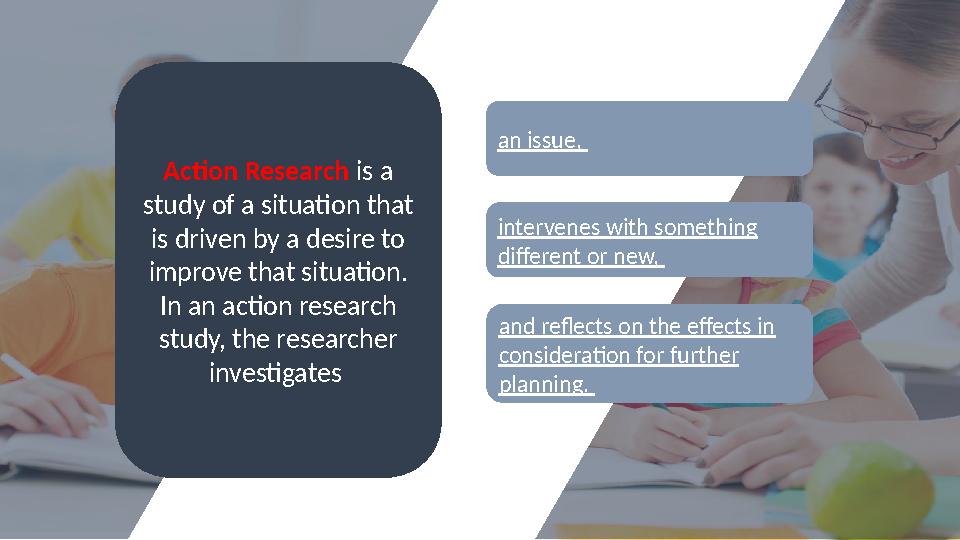
#2 слайд
Action Research is a
study of a situation that
is driven by a desire to
improve that situation.
In an action research
study, the researcher
investigates an issue,
intervenes with something
different or new,
and reflects on the effects in
consideration for further
planning.
2 слайд
Action Research is a study of a situation that is driven by a desire to improve that situation. In an action research study, the researcher investigates an issue, intervenes with something different or new, and reflects on the effects in consideration for further planning.
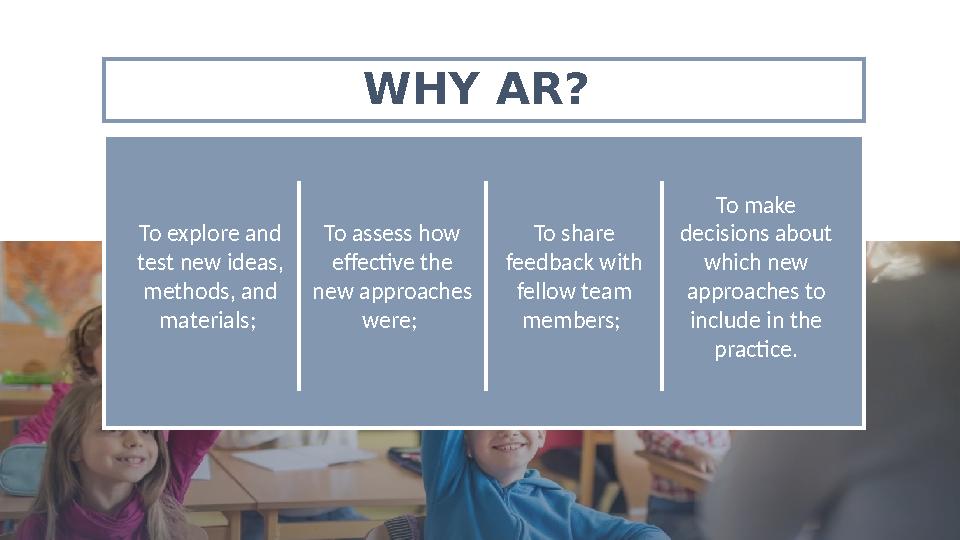
#3 слайд
WHY AR?
To explore and
test new ideas,
methods, and
materials; To share
feedback with
fellow team
members; To assess how
effective the
new approaches
were; To make
decisions about
which new
approaches to
include in the
practice.
3 слайд
WHY AR? To explore and test new ideas, methods, and materials; To share feedback with fellow team members; To assess how effective the new approaches were; To make decisions about which new approaches to include in the practice.
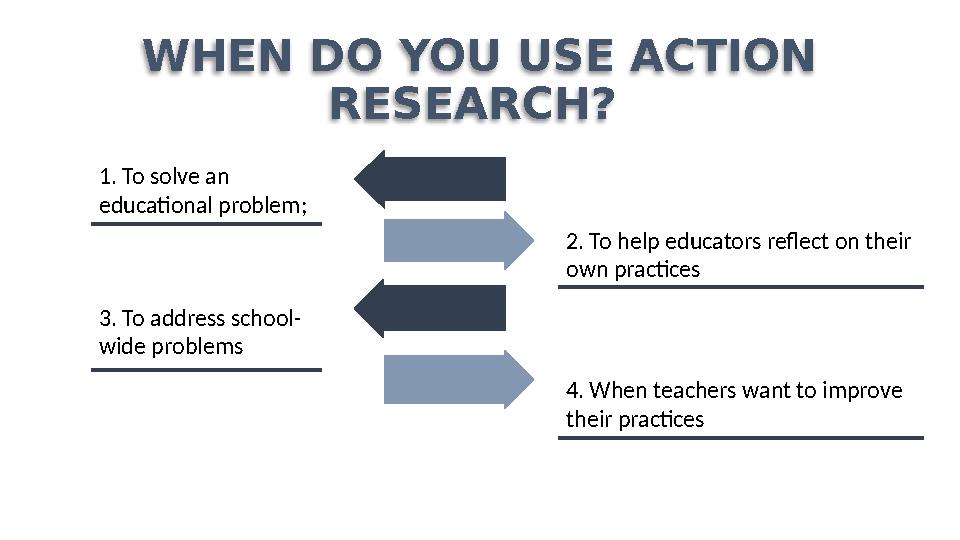
#4 слайд
WHEN DO YOU USE ACTION
RESEARCH?
1. To solve an
educational problem;
2. To help educators reflect on their
own practices
3. To address school-
wide problems
4. When teachers want to improve
their practices
4 слайд
WHEN DO YOU USE ACTION RESEARCH? 1. To solve an educational problem; 2. To help educators reflect on their own practices 3. To address school- wide problems 4. When teachers want to improve their practices
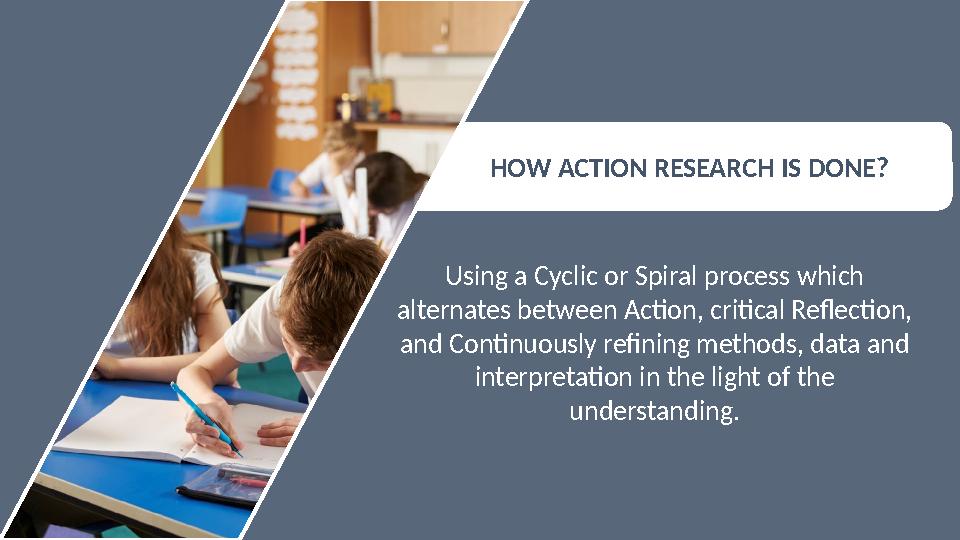
#5 слайд
HOW ACTION RESEARCH IS DONE?
Using a Cyclic or Spiral process which
alternates between Action, critical Reflection,
and Continuously refining methods, data and
interpretation in the light of the
understanding.
5 слайд
HOW ACTION RESEARCH IS DONE? Using a Cyclic or Spiral process which alternates between Action, critical Reflection, and Continuously refining methods, data and interpretation in the light of the understanding.
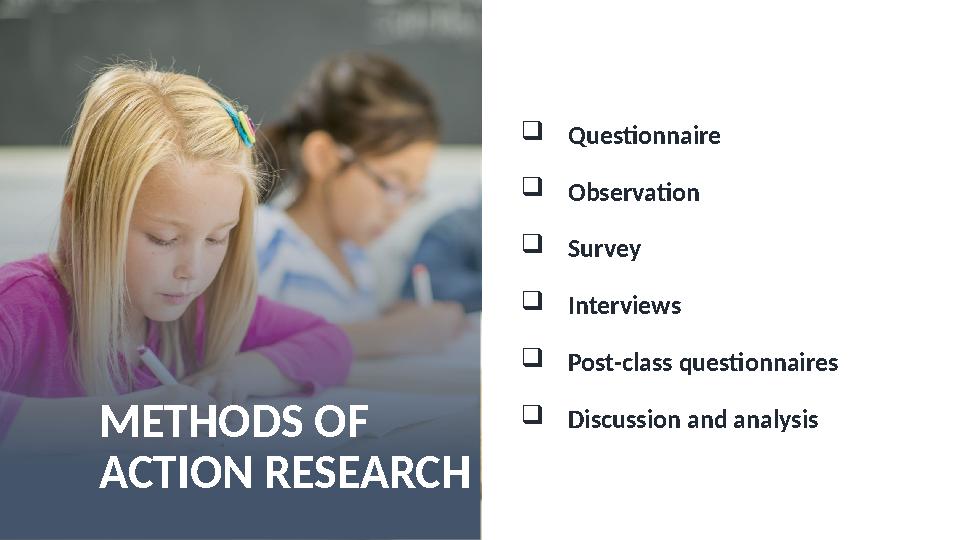
#6 слайд
METHODS OF
ACTION RESEARCH
Questionnaire
Observation
Survey
Interviews
Post-class questionnaires
Discussion and analysis
6 слайд
METHODS OF ACTION RESEARCH Questionnaire Observation Survey Interviews Post-class questionnaires Discussion and analysis
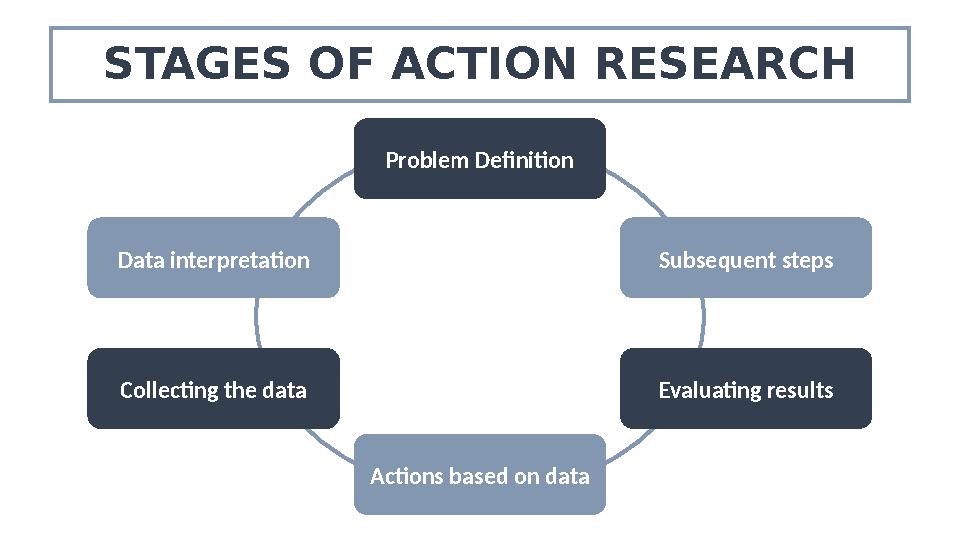
#7 слайд
STAGES OF ACTION RESEARCH
Data interpretation
Collecting the data Subsequent steps
Evaluating resultsProblem Definition
Actions based on data
7 слайд
STAGES OF ACTION RESEARCH Data interpretation Collecting the data Subsequent steps Evaluating resultsProblem Definition Actions based on data
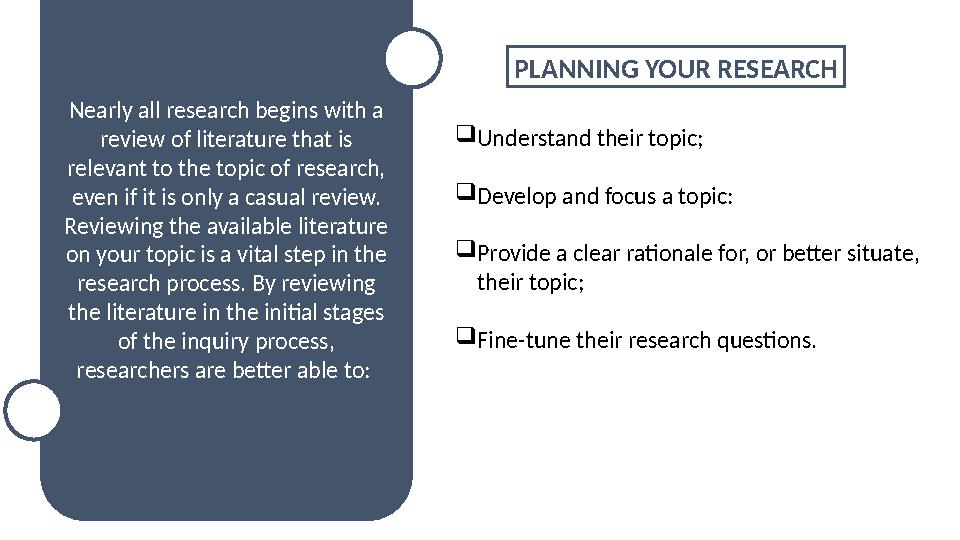
#8 слайд
Nearly all research begins with a
review of literature that is
relevant to the topic of research,
even if it is only a casual review.
Reviewing the available literature
on your topic is a vital step in the
research process. By reviewing
the literature in the initial stages
of the inquiry process,
researchers are better able to:
Understand their topic;
Develop and focus a topic:
Provide a clear rationale for, or better situate,
their topic;
Fine-tune their research questions. PLANNING YOUR RESEARCH
8 слайд
Nearly all research begins with a review of literature that is relevant to the topic of research, even if it is only a casual review. Reviewing the available literature on your topic is a vital step in the research process. By reviewing the literature in the initial stages of the inquiry process, researchers are better able to: Understand their topic; Develop and focus a topic: Provide a clear rationale for, or better situate, their topic; Fine-tune their research questions. PLANNING YOUR RESEARCH
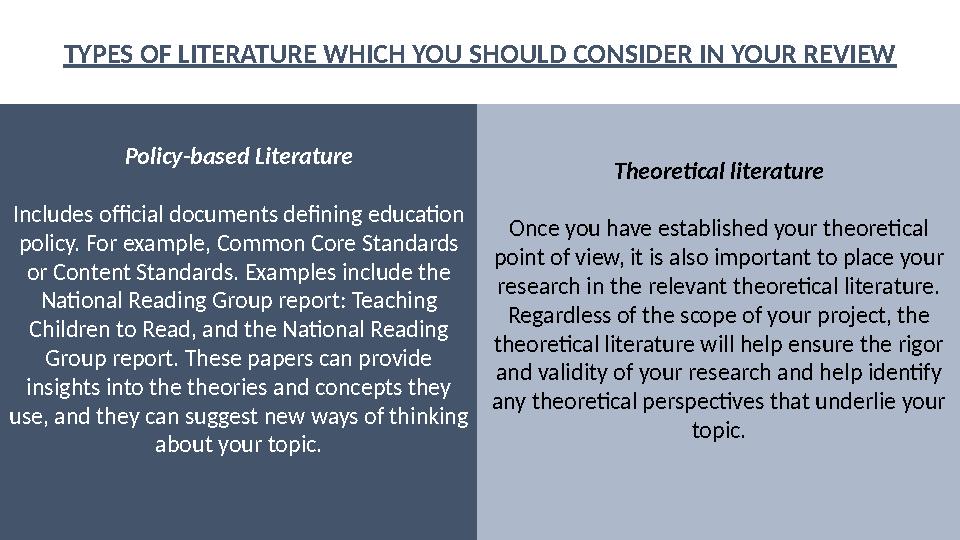
#9 слайд
Policy-based Literature
Includes official documents defining education
policy. For example, Common Core Standards
or Content Standards. Examples include the
National Reading Group report: Teaching
Children to Read, and the National Reading
Group report. These papers can provide
insights into the theories and concepts they
use, and they can suggest new ways of thinking
about your topic. Theoretical literature
Once you have established your theoretical
point of view, it is also important to place your
research in the relevant theoretical literature.
Regardless of the scope of your project, the
theoretical literature will help ensure the rigor
and validity of your research and help identify
any theoretical perspectives that underlie your
topic.TYPES OF LITERATURE WHICH YOU SHOULD CONSIDER IN YOUR REVIEW
9 слайд
Policy-based Literature Includes official documents defining education policy. For example, Common Core Standards or Content Standards. Examples include the National Reading Group report: Teaching Children to Read, and the National Reading Group report. These papers can provide insights into the theories and concepts they use, and they can suggest new ways of thinking about your topic. Theoretical literature Once you have established your theoretical point of view, it is also important to place your research in the relevant theoretical literature. Regardless of the scope of your project, the theoretical literature will help ensure the rigor and validity of your research and help identify any theoretical perspectives that underlie your topic.TYPES OF LITERATURE WHICH YOU SHOULD CONSIDER IN YOUR REVIEW
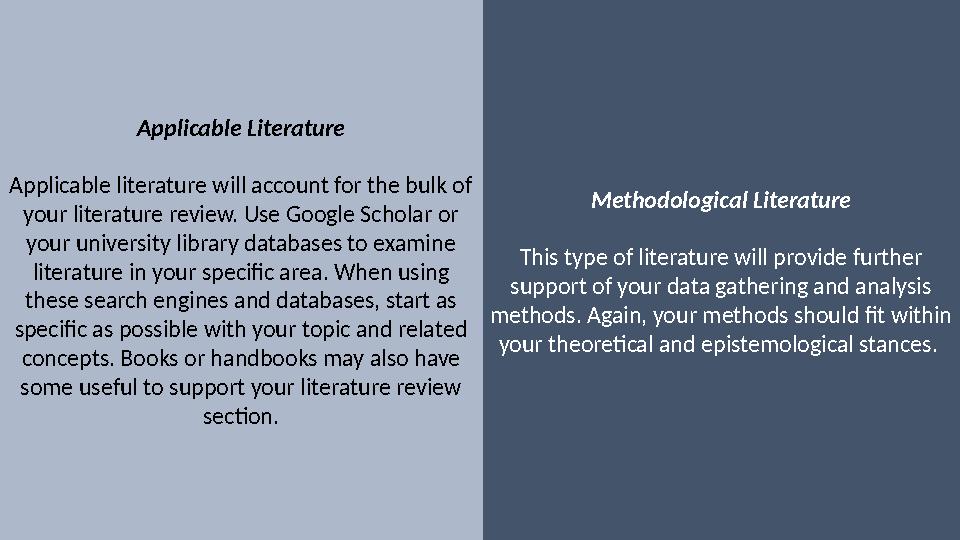
#10 слайд
Methodological Literature
This type of literature will provide further
support of your data gathering and analysis
methods. Again, your methods should fit within
your theoretical and epistemological stances. Applicable Literature
Applicable literature will account for the bulk of
your literature review. Use Google Scholar or
your university library databases to examine
literature in your specific area. When using
these search engines and databases, start as
specific as possible with your topic and related
concepts. Books or handbooks may also have
some useful to support your literature review
section.
10 слайд
Methodological Literature This type of literature will provide further support of your data gathering and analysis methods. Again, your methods should fit within your theoretical and epistemological stances. Applicable Literature Applicable literature will account for the bulk of your literature review. Use Google Scholar or your university library databases to examine literature in your specific area. When using these search engines and databases, start as specific as possible with your topic and related concepts. Books or handbooks may also have some useful to support your literature review section.

шағым қалдыра аласыз
















